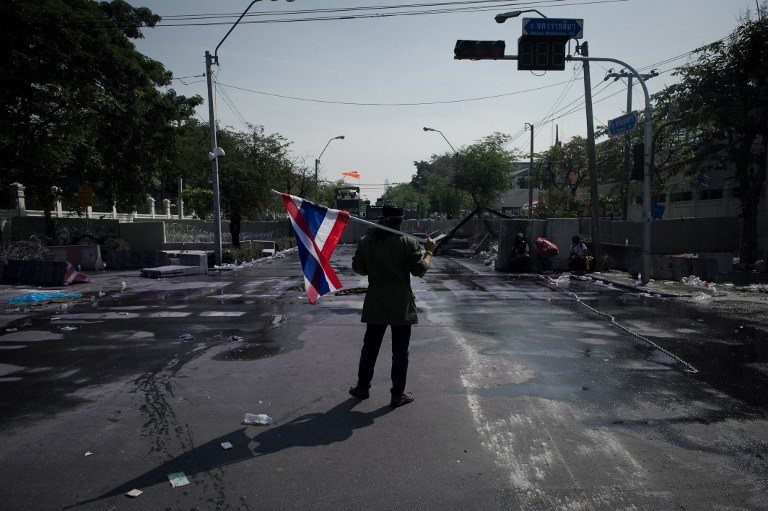SUMMARY
This is AI generated summarization, which may have errors. For context, always refer to the full article.

BANGKOK, Thailand – Thai police allowed opposition protesters through barricades outside the government and metropolitan police headquarters Tuesday, December 3, sharply easing tensions after two days of violent clashes aimed at ousting Prime Minister Yingluck Shinawatra.
The reason for the sudden thaw in hostilities was not immediately clear but it came after police said they would no longer use force to defend their Bangkok headquarters from thousands of anti-government protesters who marched on the high-profile target.
Demonstrators were allowed to approach the perimeter fence of Government House with no resistance from security forces. Dozens of protesters also streamed into the police building where they were seen shaking hands with officers, Agence France-Presse reporters saw.
Metropolitan Police chief Lieutenant General Kamronwit Thoopkrajang said his officers would no longer try to fend off protesters at the police base.
“The Metropolitan Police Headquarters belongs to the public,” he told Agence France-Presse.
“There will be no use of tear gas today,” he said. “Last night a police officer was injured by a gunshot so if we resist there will be more injuries, and we are all Thais,” he said.
The protests, aimed at unseating the elected government and replacing it with a “people’s council”, are the latest bout of unrest in the kingdom since royalist generals ousted Yingluck’s brother Thaksin Shinawatra in a coup seven years ago.
The demonstrators seized upon the developments to claim they had won the battle.
“Victory is in the hands of the people’s army. We are able to seize all key government facilities,” one of the protest leaders, Issara Somchai, said to supporters.
On Monday, December 2, police used rubber bullets, tear gas and water cannon to fend off rock-throwing demonstrators for a second day, after weekend unrest that left several dead and scores wounded.
It is the kingdom’s worst political violence since a deadly military crackdown on pro-Thaksin “Red Shirts” rallies in 2010, although the recent clashes have been largely confined to certain parts of the city, away from main tourist districts.
Thailand’s long-running political conflict broadly pits a Bangkok-based elite backed by the military and the palace against rural and working class voters loyal to Thaksin, a billionaire businessman turned premier.
The latest battle played out on the streets of Bangkok has pitted a shrinking band of hardcore protesters against pro-Thaksin political forces who have won every election in more than a decade, most recently in 2011 under Yingluck.
In her first televised address since the weeks-long protests descended into violence at the weekend, Yingluck said Monday that the protest leader’s demands were unconstitutional.
The embattled premier said she would have considered resigning or calling an election if her opponents had not already ruled out these moves as insufficient. She insisted the government was open to “every option” to restore peace.
The violence has caused growing international alarm, with the United States voicing concern about the loss of life.
“Peaceful protest and freedom of expression are important aspects of democracy,” a State Department spokeswoman said. “Violence and seizure of public or private property, however, are not acceptable means of resolving political differences.”
UN chief Ban Ki-moon said he was worried about the escalating violence, calling on all parties to exercise restraint.
Clashes had continued through the night as police fought to defend barriers at the prime minister’s offices and police headquarters.
Police said two of their trucks were set ablaze near Government House. Police helicopters dropped leaflets at the two rally bases giving notice of an arrest warrant issued for protest leader Suthep Thaugsuban for insurrection, urging demonstrators to leave.
The rallies were triggered by an amnesty bill, since abandoned by the ruling party, which opponents feared would have allowed Thaksin to return to his home country, which he fled in 2008 to avoid jail for a corruption conviction he contends is politically motivated.
The demonstrators are a mix of royalists, Thaksin opponents, students and supporters of the opposition Democrats, who have not won an election in 20 years.
While the numbers have fallen sharply since an estimated 180,000 people joined an opposition rally on November 24, protesters have besieged high-profile targets – including several key ministries – in what some observers believe is an attempt to provoke a military coup.
Thailand has seen 18 actual or attempted coups since 1932, most recently with Thaksin’s overthrow in 2006. But the military has appeared reluctant to intervene in the current standoff.
“I will let this problem be solved by politics. The military will observe from a distance,” army chief Prayut Chan-O-Cha told reporters Tuesday. – Rappler.com
Add a comment
How does this make you feel?
There are no comments yet. Add your comment to start the conversation.